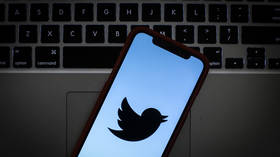The state of this! Twitter’s advertising ban is ideological & anti-democratic
Neil Clark is a journalist, writer, broadcaster and blogger. He has written for many newspapers and magazines in the UK and other countries including The Guardian, Morning Star, Daily and Sunday Express, Mail on Sunday, Daily Mail, Daily Telegraph, New Statesman, The Spectator, The Week, and The American Conservative. He is a regular pundit on RT and has also appeared on BBC TV and radio, Sky News, Press TV and the Voice of Russia. He is the co-founder of the Campaign For Public Ownership @PublicOwnership. His award winning blog can be found at www.neilclark66.blogspot.com. He tweets on politics and world affairs @NeilClark66
Published time: 20 Aug, 2019 13:14

The news that Twitter is to ban ‘state-controlled news media entities’ from advertising on its platforms raises several worrying concerns which urgently need to be addressed.
Repeat after me (with robotic hand movements): “state-controlled news media entities bad; ‘state-subsidised’ ‘private’ news media entities good!”
This seems to be the logic that Twitter is working from in light of its announcement on Monday.
The move seems to be a reaction to criticism of the social media platform for accepting advertising buys from the Chinese press agency Xinhua, which has been critical of the anti-government protesters in Hong Kong.
But underlying the new policy is some very muddled thinking. The premise seems to be that ‘state-controlled news media entities‘ are inherently biased, and so should have their social media activities curbed whereas as ‘privately-controlled’ media entities aren’t. It elevates the ‘state’ as the most powerful actor there is.
ALSO ON RT.COMTwitter bans ‘state media’ from advertising… and guess who decides how they are defined
But is this really true? Ask yourself this question: who has more influence, ‘state-controlled news media entities’ of say Belarus, or the gi-normous Murdoch media empire, which has, over the past thirty years or so, been relentlessly and quite shamelessly propagandising for neocon wars of aggression? But advertising from News Corp will not be affected by the Twitter ban. Just how fair is that?
In any case, the distinction between “state-controlled news media entities” and “taxpayer-funded entities, including independent public broadcasters,” who will not be affected by the ban, is not easy to make.
It’s truly Orwellian that the ‘informers’ Twitter will rely upon to make the distinction, include bodies which themselves receive state-funding, like the US government-funded NGO Freedom House.
The way Twitter has framed its new policy will have a detrimental impact on media organisations which are actually very honest about being state-owned, and will favour those that have a less obvious relationship with national governments, but one that is still there.
Looking at the bigger picture, the move can be seen as part of an ongoing assault on all media, whether state-controlled, or not, which provides a platform for opinions which deviate from the extreme neoliberal ‘centre’ and which holds up neocon/liberal interventionist foreign policy to proper scrutiny. In Britain, the advertising revenue of a number of popular anti-war left-wing sites has been targeted. What we are witnessing is old-fashioned political censorship in the 21st century, in the name of fighting ‘fake news.’
We can also see the Twitter move as part of the campaign to de-legitimise public ownership. ‘State-controlled’ is bad, but Murdoch-controlled isn’t. In fact ‘state-controlled’ can be and often is, much more democratic than being controlled by a giant corporation. Twitter says that in determining what is ‘state-controlled news media,’ its arbiters will look at “control of editorial content, financial ownership, influence or interference over broadcasters, editors, and journalists, direct and indirect exertion of political pressure, and/or control over the production and distribution process.”
ALSO ON RT.COMChina accuses Twitter & Facebook of censorship over Hong Kong protest criticism
But why isn’t it doing the same for all media advertisers? The Iraq war divided opinion in the West, with massive anti-war protests leading up to the illegal invasion. But in the Murdoch media empire there was no such division. It was estimated that all 175 of Murdoch’s editors, like Mr Murdoch himself, supportedthe war. What an extraordinary coincidence!
In 2012, the then editor of the Daily Mail, Paul Dacre went so far as to say that Britain could not have invaded Iraq without the support of News International proprietor Rupert Murdoch. “I don’t think there’s any doubt that he had strong views which he communicated to his editors and expected them to be followed. The classic case is the Iraq War. I’m not sure that the Blair government or Tony Blair would have been able to take the British people to war if it hadn’t been for the implacable support provided by the Murdoch papers. There’s no doubt that came from Mr Murdoch himself.”
We hear so much about the ‘state-controlled media’ of Russia, China or any other ‘official enemy’ pumping out ‘propaganda’, but if we look at this with total objectivity we will see that the most deadly propaganda – misinformation which has led to the deaths of hundreds of thousands, if not millions of people – has come from elsewhere. It’s come, ironically enough, from those outlets which spend so much time accusing others of being propagandists.
As always, when media curtailments are being discussed we need to ask the question: ‘Cui bono?’
The cheerleaders for ‘Shock and Awe’, that’s who.
Follow Neil Clark @NeilClark66
The statements, views and opinions expressed in this column are solely those of the author and do not necessarily represent those of RT.

0 Comments:
Post a Comment
Subscribe to Post Comments [Atom]
<< Home